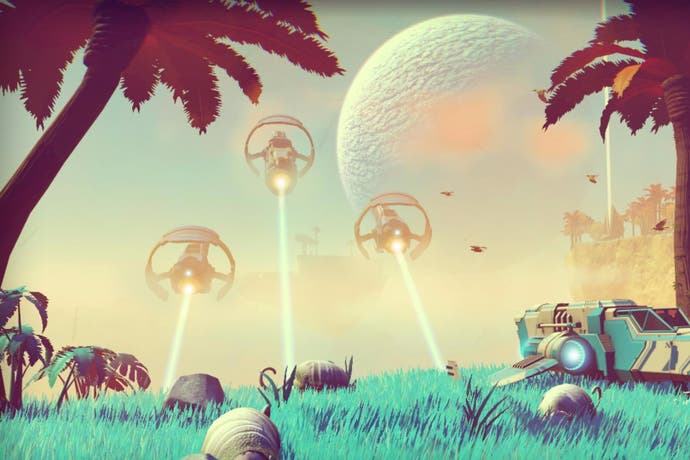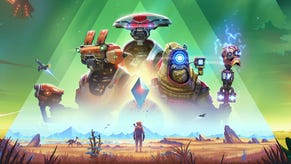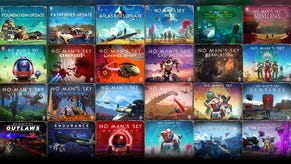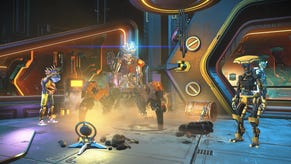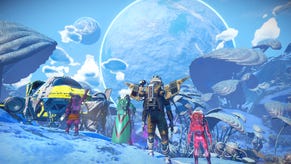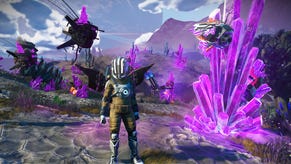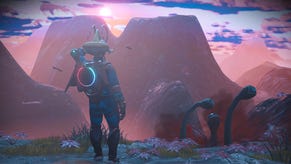No Man's Sky's long-awaited update brings its galaxy back to life
Forward the Foundation.
Let's get the awkward bit out of the way first.
I liked No Man's Sky. For the two weeks just after launch when I was firmly under its spell, I really liked No Man's Sky, and was happily lost to its lulling loop of exploration and adventure. There's something soothing about the gentle brand of sci-fi that fuelled Hello Games and No Man's Sky's infectiously sanguine artwork, all hazy purples and pinks swirling together like the Chris Foss artwork that inspired it. If you've ever spent long lazy evenings leafing through dog-eared Panther paperbacks, No Man's Sky could feel pretty special; having been sucked in by the sci-fi splendour of those early trailers, it was every inch the game I wanted to play.
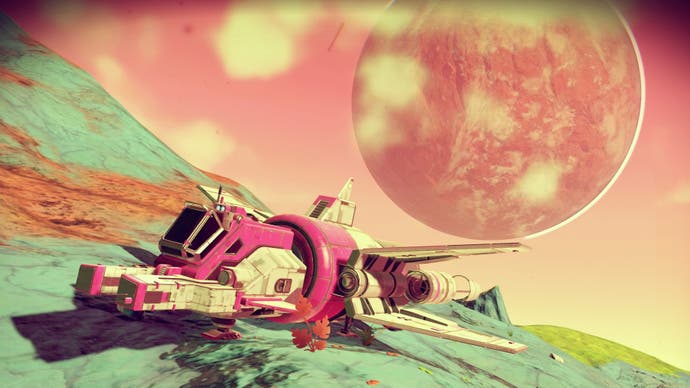
For many others it wasn't, though. Maybe it was the air of well-engineered enigma that lingered throughout the pre-launch process, the half-truths or, in one oft-cited example, the outright lies, but for many No Man's Sky fell well short of their expectations. Its more polite critics called it a husk, its more vitriolic an absolute sham and Hello Games' mute approach didn't help silence the almighty din that met the release. Until, eventually, it did. The subreddit slowed to a halt, charting only the number of days since Hello Games' had spoken about the game. Players moved on, and it seemed for a while that No Man's Sky was happy to be finally forgotten.
But now this. The Foundation update - named not only for its promise of more yet to come, but also pointedly drawing upon Asimov's series of the same name and its exploration of the beginning of a new galactic empire - suggests after all the talk in the run-up to the release of No Man's Sky got Hello Games into trouble, now it plans to go about its business through actions rather than words. It's a substantial update, released without hype or fanfare, and the reception so far has been positive (the Steam reviews have now flickered up from overwhelmingly negative to mostly negative - some progress, I'm sure you'll agree). You sense that, if given the chance to go back and do it all over again, perhaps Hello Games would rather it went about the release of No Man's Sky itself this way in the first place.
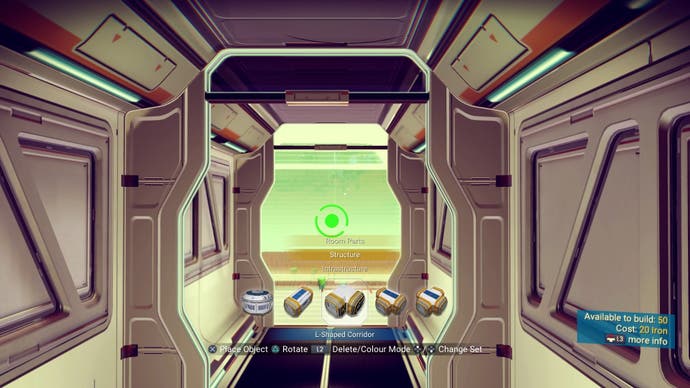
There are grand, sweeping changes ushered in here. Construction and base-building are the headline additions, revealing a side to No Man's Sky that feels a little unexpected. It's not the most extravagant, complex toolbox you'll find, but like much else in No Man's Sky - and true to a developer that's always favoured Nintendo's soft-edged approachability in its work - it's an effective and easy to use kit that has you building elaborate bases with little friction. It's the survival genre wrapped in cotton, and as someone who's previously had little patience for the complexities of Ark that's not necessarily a bad thing.
The bases do bring a fair amount of new depth, mind. Experts must be recruited from space stations to unlock new components, and there's a pleasure to be taken in staffing them up and building them out to make an efficient farming and storage foundation for your excursions. In these early days there's something of a clash with the way I've previously played No Man's Sky, though - while it's easy to teleport to and from bases via portals placed in the space stations that can be found in every system, in a game that for me has always been about the thrill of pushing onwards into the unknown there's something counter-intuitive about having an anchor always pulling you back.
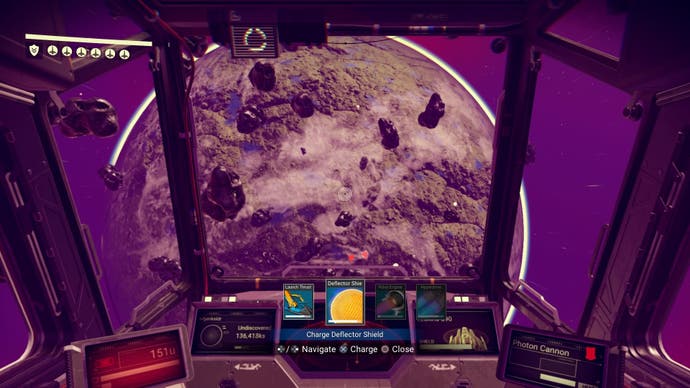
That's where the freighters come in, hulking haulage ships that can be summoned above planets and which can also perform the same storage and farming duties with their upper levels allowing base building to some degree. They come at a cost, mind - the seven million units required to buy even the most basic one I've come across is a little out of my price range at present - but for that you do get a gorgeous craft that catches the eye as it floats in the heavens.
For all those headline additions bring - and they do suggest that Hello Games is capable of taking No Man's Sky in some interesting directions - it's the smaller changes that have impressed me the most. Small quality of life improvements such as new menus that can be navigated on the fly, allowing you to charge tech without being pulled out of whatever action you're engaging in, make a huge difference to the moment to moment play. There's also the addition of motion blur and temporal AA that makes No Man's Sky - always a game that, despite its sometimes limited means, was capable of making me catch my breath - that little bit more gorgeous.
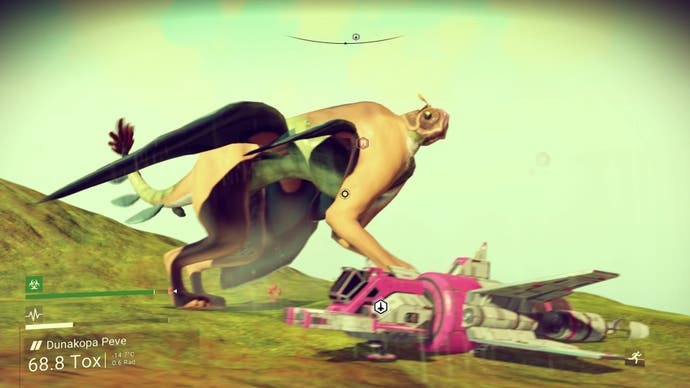
Then there's the bigger, almost unspoken change that's been ushered in with the Foundation update. This is an entirely new universe, the algorithms that dictate what you come across on your travels tweaked to ensure more diversity, more strangeness and more believable planet scapes. It means everything that's gone before it has been torn up and tossed aside, but the sacrifice seems worth it. Some planets are entirely uninhabited, the odd feeling in the original version of coming across the same settlements on each surface ironed out as buildings are now more sparse. It makes for a tougher, lonelier game, even away from the all-new survival mode - resources are now more scarce and have to be sought out on different planets rather than all being clustered together - but it makes for a more beautiful game, too.
Skimming over the surface of a planet submerged in water with the occasional sprawling landmass, all pink grass softened by a radiant sky, was enough to make me fall in love with No Man's Sky again. Disembarking, I find myself in what seems like a small copse, until disturbingly the trees begin to move, clambering back to reveal a creature larger than anything I'd encountered in my previous 40 hours with the game. Maybe it's something that's always been possible, or maybe it's a result of those new algorithms - either way, it's nice to have an excuse to go back in and make fresh discoveries.
Whether it's enough to calm the storm that's surrounded No Man's Sky since its launch remains to be seen, and even given the new additions this remains an acquired taste. Some issues are too fundamental for even a change in foundations to address - the sense of purpose many felt lacking is still hard to find, and the notoriously hollow reward to be found at the centre of the universe will always hang over this game. As a fairly happy lone traveller through star systems, that's never bothered me so much. The destination has never been a concern, and these recent furnishings only help make the journey that little bit more enjoyable.
